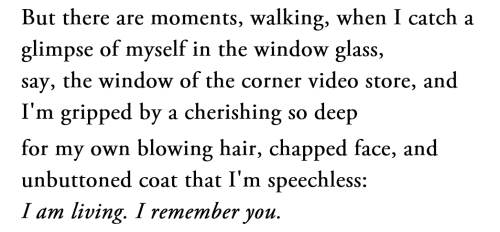Latest Posts by hopelessromantism - Page 9
Might fuck around and create a fantasy world in my mind to distract myself from the pressures of reality.
appreciation post for everyone whos ever talked to me bc im annoying and dumb
one of my favourite things in the entire world is when there’s a huge thunderstorm outside and it’s raining heavily and you’re in bed swathed in blankets and you have just never felt warmer and safer than you do in that moment
i like to think that our blogs are just our own little personal museums of all the things we like, and we can visit each other’s museums and leave nice notes at the reception.
idk it just feels so good when you realize a fandom friend has become ur friend friend—y’know? like instead of only talking about ur common interest u start branching out and talking to each other about your lives, your other hobbies, and it’s even cooler to remain close if one or both of you lose interest in the fandom you met in. your bond, no longer dependent on the mutual love you had for some thing—now lies upon the kinship you’ve built. i think that’s beautiful

- Clarice Lispector, A Breath of Life.
“how many times have people used a pen or paintbrush because they couldn’t pull the trigger?”
— 𝘝𝘪𝘳𝘨𝘪𝘯𝘪𝘢 𝘞𝘰𝘰𝘭𝘧

What the Living Do, Marie Howe
There are 5 types of fear
1. Terror 2. Panic 3. 14 missed calls from mom 4. Username or password is incorrect 5. “We need to talk”







this will always be one of my faves

kanye sleeping.
What happens once you kill yourself? Because I'm ready to go.
You wanna know what happens once you kill yourself? Your mother comes home from work and finds her baby dead and she screams and runs over to you and tries to get you to wake up but you won’t and she keeps screaming and shaking you and her tears are dripping onto your face and your dad hears all the screaming and runs into the room and he can’t even speak because the child that he loved and the child that he watched grow up is gone forever and finally your little sister runs into the room to see what all the fuss is about and she sees you dead. The person she looked up to and loved. The person she bragged about to her friends, the person she wanted to be just like when she grew up, the person that made her feel safe. But she’s never really going to get to grow up and smile and laugh and love because she’ll always be consumed with this feeling of missing you. And now there’s something missing from your family and they can barely look at each other anymore because everything reminds them of you but you’re gone and hurts more than anything. and you think that your mom never cared because she was always busy and yelling at you to finish your homework and clean your room and forgot to say I love you sometimes but really, she loved you more than anything and she doesn’t leave the house anymore, she can’t even get out of bed and she’s getting thinner and thinner because it’s too hard to eat. Your father had to quit his job and he doesn’t sleep anymore, every time he closes his eyes he sees his baby dead, and the image never goes away no matter how much alcohol he drinks. And at school your best friend sees that your seat is empty and she gets this sick feeling in her stomach and that’s when she hears the announcement. You killed yourself. And suddenly she’s screaming and crying in the middle of class and no one even bothers comforting because they’re all busy sitting there staring at your empty seat with tears dripping down their cheeks and all she wants is for you to hug her and tell her it’s gonna be okay like you always did, but this time, you’re not there to do it, everything is dark now that you’re gone and her grades are slipping, she barely goes to school anymore and she ended up in hospital after taking too many pills because she wanted to see you again. the girls who used to make fun of the way you dressed feel their throats get tight, they don’t talk to each other anymore, they don’t talk to anyone, they’re all in therapy trying so hard not to blame themselves but nothing works. and your teacher who always gave you a hard time stares blankly at the wall, she quits her job a few days later. And then your boyfriend hears the news and he can’t breathe, he still calls you a lot just to hear your voice and he talks to you on facebook but you never message him back, he can’t fall in love again because every girl he meets reminds him of you, he’s never going to get over you, he loved you and he cries himself to sleep every night, hating himself and slicing his skin because he couldn’t save you and he’s never going to hold you in his arms or hear you laugh again. Now everyone who knew you, whether they were a big part of your life or someone you passed in the hallway a few times a week, they carry this aching feeling around inside them because you’re gone, and they miss you, and they don’t know why you left but it must’ve been their fault and they should’ve stopped you and they should’ve told you they loved you more and that feeling is never going to go away. And so you killed yourself
but you killed everyone else around you too.


please break my heart
the reason i like staying up late so much is because between the hours of 1am-5am, the world is quiet and no one expects anything from me. i could stare at my wall for 4 hours and there would be no consequences. it’s so silent and calm. i love it
Damn.....
“Life is too short for shitty sex and bad relationships. So go find someone who fucks you right and treats you how you deserve to be treated.”
— (via hplyrikz)
Clear your mind here
(via hplyrikz)
LMAO 😂
Hoe tip #7
Do not fight over dick
As I get older the more I appreciate straight forward people. Like if you’re mad at me I will respect you if you tell me. I don’t understand adults that would rather stomp their feet and use passive aggressive behavior to communicate. Life does not have to be this difficult fam


excited to go back to campus in the fall! hopefully i’ll get the chance to attend some in person seminar courses.
forever removing “agree to disagree” from my vocabulary now i end all my arguments with “live with what makes you comfortable but know that ultimately you’re not telling yourself the truth” and that’s on me being sick and tired <3 we’re burning bridges today









𝐏𝐫𝐨𝐩𝐡𝐞𝐭 𝐕𝐈. “If you get hit by a 𝐜𝐚𝐦𝐩𝐮𝐬 𝐛𝐮𝐬, you get your tuition 𝐩𝐚𝐢𝐝.”
do yall ever get things stuck in your head like not lyrics or anything like that but just random phrases or strings of words pop up in your brain and just keep repeating themselves in weird order over n over
not me romanticizing my classes and pretending I’m a novelist in the 18th century about to publish my first draft when in fact I am just sitting in my dorm with a blank Google Doc




"There is a reason why all things are as they are"
-Dracula, Bram Stoker
I saw an article called “Make Peace With Your Unlived Life” and it really made me stop and think. So much of our lives is mourning for what we didn’t become. It’s a waste. We didn’t waste any opportunities. What came and went was not meant for us.
not gonna lie i’m pretty uncomfortable like all the time
Personality
Personality is a very commonly used term, however it’s very difficult to define- some psychologists argue that it is biological and thus innate while others argue it is the accumulation of your individual experiences. An example is the idea behind Type A and Type B personalities- Type A people tend to be high strung, competitive, and ambitious. Type B people tend to be more laid back.
Psychoanalytic Theory
Sigmund Freud believed that personality was set in early childhood, as children go through his proposed stages of development (oral, anal, phallic, latent, genital). During the phallic stage, as pleasure moves towards the genitals, young boys go through the Oedipus crisis, and young girls go through the Electra crisis when they feel competition towards their same sex parent, and attraction to their opposite sex parent. Freud believed that as boys and girls notice their physical differences, girls experience penis envy (I really hate Sigmund Freud), and boys experience castration anxiety, where they fear they will be castrated if they misbehave. To protect themselves against this, they use identification as a defence mechanism. Identification is when people emulate and attach themselves to an individual they believe threatens them- this leads to boys attaching to their fathers and detaching from their mothers. Fixation on one of the stages of development can cause certain personality quirks- for instance, fixation on the anal stage may lead to someone with an anal expulsive personality, describing someone messy and disorganised. It may also cause an anal retentive personality, where the person is neat and hyperorganised.
Freud believed most human behaviour comes from the unconscious. We spend a lot of mental energy keeping unacceptable thoughts in the unconscious mind. There is also the preconscious (containing everything we could potentially summon to conscious awareness) and the conscious (containing everything we are thinking of at a given moment). He also thought that the personality came from three parts:
The id, which exists from birth is in the unconscious and is made of instincts and psychic energy- he thought there were two kinds of instincts, Eros (life instincts) and Thanatos (death instincts). Libido drives life instincts. The id is controlled by the pleasure principle which is the desire for immediate gratification.
The ego follows the reality principle. It emerges around ages 2 or 3, and operates partly in the conscious mind, and partly in the unconscious mind. It negotiates the desires of the id and the limitations of the environment.
The superego is also partially in the unconscious mind and partially in the conscious mind. It emerges around age 5 and is the conscience. The ego often has to act as the mediator of the superego and the id.
The ego uses defence mechanisms to protect the conscious mind from threatening thoughts. Some of these include:
Repression- Blocking thoughts from conscious awareness
Denial- Not accepting the truth
Displacement- Redirecting feelings towards another person or object.
Projection- Believing that the feelings one has towards someone else are actually held by the other person and directed at oneself
Reaction Formation- Expressing the opposite of how one truly feels
Regression- Returning to an earlier, comforting behaviour
Rationalisation- Coming up with a beneficial result of an undesirable circumstance
Intellectualisation- Undertaking an academic, unemotional study of a topic
Sublimation- Channelling one’s frustration towards another goal (often viewed as one of the more healthy defence mechanisms)
It should go without saying that a lot of Freud’s views are criticised for being nearly, if not completely impossible to study and prove. His theories have very little predictive power, and is seen as overestimating the importance of early childhood and sex. Finally, a lot of Freud’s views are very objectionable, and likely were guided by misogyny. His ideas of penis envy, and that women have weaker superegos seem to be based more on bias than empirical evidence. Feminists like Karen Horney and Nancy Chorodow suggested that if women were jealous of men, it was because of the advantages men enjoyed in society, rather than a simple desire to have a penis. They suggested the idea of womb envy, where mean are jealous of women’s reproductive capabilities.
Psychodynamic Theories
Freud’s followers developed offshoots of his theories. These new approaches are referred to as psychodynamic or neo-Freudian approaches. Carl Jung proposed that the unconscious is made of 2 different parts: the personal unconscious, containing the painful memories and thoughts the person doesn’t want to confront, termed as complexes, and the collective unconscious which is passed down by species, explaining certain cultural similarities. The collective unconscious contains archetypes which are universal concepts we all share, such as the shadow which represents the evil side of personality, and the persona which is people’s creation of a public image. Alfred Adler focused less on the unconscious, and more on the conscious role of the ego. He believed people are motivated by the fear of failure (inferiority) and the desire to achieve (superiority).
Trait Theories
Trait theorists believe that personality can be described by specifying peoples main characteristics, which they view as stable and motivate people’s behaviour. Some trait theorists believe the same basic traits can describe all people’s personalities (this is a nomothetic approach). Hans Eysenck believed that by placing people on an introversion-extroversion scale and a stable-unstable scale that he could describe their personalities. Raymond Cattell developed the 16 PF (personality factor test). More modern psychologists like Paul Costa and Robert McCrae felt personality can be described using the big five personality traits; extraversion, agreeableness, conscientiousness, openness to new experiences, and emotional stability/neuroticism. In order to reduce the massive amounts of terms we use to describe people into 16 or 5 traits, factor analysis may be used. This is a statistical technique allowing researchers to use correlations between traits to see which cluster together as factors.
Other trait theorists (ideographic theorists) state that using the same set of terms to describe everyone is nonsensical. Instead, each person can be described using a unique set of traits. Gordon Allport believed that a full understanding of someone’s personality was impossible when disregarding their personal traits. Allport found that a small number of people are so intensely influenced by one trait that it informs nearly everything that they do. These traits are cardinal dispositions. There are two other types of dispositions: central dispositions and secondary dispositions. Central dispositions have a larger influence on personality than do secondary dispositions.
Biological Theories
One of the oldest personality theories was biological. Hippocrates believed that personality was determined by the level of the 4 humours - blood, yellow bile, black bile, and phlegm. Biological theorists view genes, chemicals, and body types as the primary influencer of personality. There is growing evidence that the human personality is partially shaped by genetics. However, little evidence exists supporting the heritability of specific personality traits. This varies based on the type of trait- height is more heritable than intelligence, for example. However, evidence suggests that temperament (someone’s emotional style and way of dealing with the world) is heavily influenced by genes. One example of another early biological theory was William Sheldon’s somatotype theory. This theory identified 3 body types- endomorphs (fat), mesomorphs (muscular), and ectomorphs (thin) and associated different traits for each of these body types. A lot of Sheldon’s research, however, only showed correlation.
Behaviourist Theories
Behaviourists like B.F Skinner have a very different view on personality. They believe that behaviour is what determines personality- the reinforcement contingencies that one is exposed to is what creates personality, so by changing someone’s environment, you can change their personality
Social-Cognitive Theories
These theories meld together behaviourists view of the importance of the environment, and cognitive psychologists focus on patterns of thought. Albert Bandura believed that personality is created by the interaction between a persons traits, their environment, and their behaviour. He based his model on the idea of triadic reciprocality (reciprocal determinism)- meaning that each of these 3 factors influence the others in a looplike fashion. He also posited that personality is effected by a sense of self-efficacy- people with high self-efficacy are confident in their ability to do things while people with low self-efficacy feel powerless. The level of self-efficacy determines people’s actions, and as a result, the outcome of those actions. George Kelly created the personal-construct theory- suggesting that people, as they attempt to understand the world develop their own individual systems of personal constructs. Thus, personality is based on how people see the world. This theory is based on a fundamental postulate that states that behaviour is influenced by cognitions. Finally, Julian Rotter created the concept of locus of control. People either have an internal or external locus of control. Someone with an internal locus of control feels responsible for what happens to them (”hard work leads to success”). Someone with an external locus of control believe that luck and outside forces determine their destinies (”what family you’re born into determines success”)
Humanistic Theories
Most of the previous models, such as behaviourism and psychoanalysis are deterministic- which is the belief that what happens is dictated by what happened in the past. Neither support the idea of free will- which is the ability of someone to choose their own destiny (you goh the chance ta change yer fate!) The humanistic perspective is sometimes referred to as the third force as it arose in opposition to the determinism of behaviourism and psychoanalysis. Humanistic personality theories view people as innately good and able to determine their own destinies as they exercise free will. They stress the importance of someone’s self-concept (a person’s global feeling about themselves) and self-esteem (a person’s evaluation of their own self worth)
Abraham Maslow and Carl Rogers are the two most influential humanistic psychologists. They both believed that people are motivated to self-actualise. Rogers created self-theory- the idea that although people are innately good, they need things like unconditional positive regard from their interactions with others in order to self-actualise.
Assessment Techniques
When assessing personality, reliability (consistency) and validity (accuracy) are extremely important. Depending on their theories, psychologists methods for studying personality may differ.
Psychoanalysts tend to use projective tests, where they ask people to interpret ambiguous stimuli. For example, the Rorschach inkblot test, (where someone describes an inkblot) or the thematic apperception test (where someone describes what’s happening in a picture). Psychoanalysts believe these tests are outlets to project unconscious thoughts. Many people view projective tests as unreliable. A more simple and widespread method of personality assessment is self-report inventories where people take questionnaires, providing information about themselves. These kinds of tests are referred to as objective personality tests, versus an interview which would be called a subjective personality test, due to the potential for evaluator bias. An example is the Minnesota multi phasic personality inventory (MMPI-2) which is the most widely used. These tests can be viewed as invalid, however, as people may not be honest when answering questions. Radical behaviourists reject both of these assessments, preferring instead to observe behaviour in order to determine personality.
People tend to be curious about what personality assessments say about them, however this curiousity tends to make them easier to deceive. People tend to see themselves in vague descriptions of personality- this phenomenon is named the Barnum effect (after P.T Barnum) and is abused by people like astrologers, psychics, and fortune tellers.

Jusepe de Ribera - The Sense of Touch.
In short, how would you define 'gothic' ? for someone who has read some very basic gothic stuff but is trying to arrive at a good overarching descriptor.
This is difficult— I have yet to read a definition that encompasses the Gothic genre. Patrick Kennedy defines it as “writing that employs dark and picturesque scenery, startling and melodramatic narrative devices, and an overall atmosphere of exoticism, mystery, fear, and dread” but this doesn’t ring quite true— yes, the Gothic deals with dread, but it does not always have dark and picturesque scenery, and it does not always rely on exoticism. James Greaver and Ginna Wilkerson define it as “a style of writing that is characterized by elements of fear, horror, death, and gloom, as well as romantic elements, such as nature, individuality, and very high emotion” and while this comes closer, it doesn’t necessarily encompass all of Gothic. Enclyclopedia.com defines it as “a literary movement that focused on ruin, decay, death, terror, and chaos, and privileged irrationality and passion over rationality and reason, grew in response to the historical, sociological, psychological, and political contexts of the late eighteenth and early nineteenth centuries” which isn’t wrong, but also is missing slightly.
So, I can’t really offer a good defintion, but I can tell you about issues the Gothic is concerned with.
the sublime : a combination of awe and terror. Poets.org has a good article on this concept. and in relation to the sublime:
the unexplainable : the Gothic was very much a response to the enlightenment’s attempt to realise and create explanation— the questions the Gothic poses are Are there things beyond science? How do we react to what cannot be explained with scientific and logical means?
excess : emotion and stakes are high. Consider the impassioned love confessions of Wuthering Heights (“You said I killed you— haunt me, then!”) the debauchery and decadence of Dorian Gray (see also: the decadent movement, which was intimately related to the Gothic). Gothic lovers are lovers who often have potential to destroy one another because of their excess of emotion and desire. It’s like opera: everything is heightened by the experience of the sublime surroundings. The human spirit is expanded, often until it bursts.
boundaries and trangression/violation of those boundaries : boundaries of death, boundaries of gender, boundaries of social class, boundaries of race, boundaries of desire, boundaries of mind and reality. In Frankenstein this might be Victor creating the creature; it may be Carmilla’s lesbian (and thus transgressive) desire for Laura: it may be Will Graham’s desire to enact violence as an independent agent rather than as an agent of the law. I mentioned the sublime before, and I want to note that the sublime itself is transgressive: it’s beyond normal human experience. and in this regard it’s also about:
setting : setting is never just setting: it’s also psychological, a reflection of the characters. Brontë compares Catherine to the landscape she inhabits;
the horror of imagination and the psychological interior : Emily Dickinson: “one need not be a chamber to be haunted”. Consider Freud’s idea of the unconscious mind. I don’t know if you’ve seen Stalker (a film by Andrei Tarkovsky) but one plot element it has is called the “Room” which grants the wishes of anyone who sets food inside. but it’s not about what you actually wish for— it’s about your innermost desire, one you may not even be conscious of. There’s the story of a man who went with his brother to the room, and his brother died along the way. And he entered the room, and then he inherited a lot of money, which led him to commit suicide. Why? Because it revealed that his greatest desire was not to bring back his brother, but to be wealthy. The horror of that realization compelled him to kill himself. The Gothic is very much about people confronting their interiors: the horrors they have committed (willingly or unwillingly), the horrors their family committed, the horrors they discover that reveal the darkness someone close to them (Bluebeard), the horrors of history (consider Toni Morrison’s Beloved), etc. The interior is often the historical, and the plot of Gothic novels can almost only end when it is confronted.
As for the difference between the Gothic and Horror, horror often deals with a concrete terror. In Gothic literature, the monster may be real, but the monster is not the sole source of terror: the source of terror is also often psychological. Horror is resolved by confronting an outside force: the Gothic is resolved by confronting ourselves.









let's go on an adventure

Shoda Koho, Moonlit Sea, c. 1920
